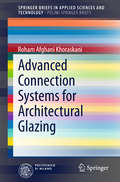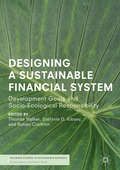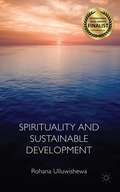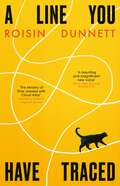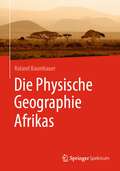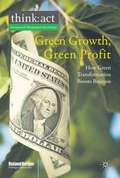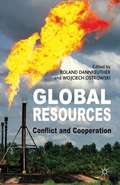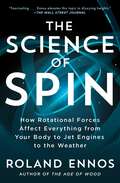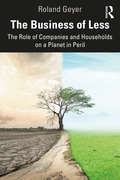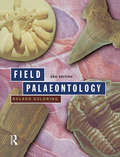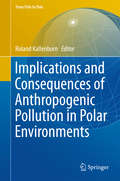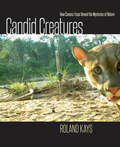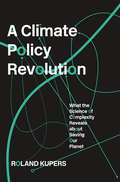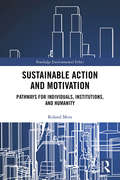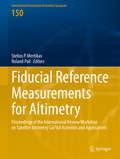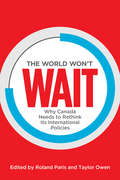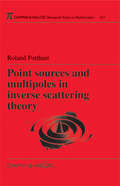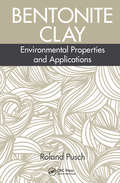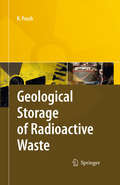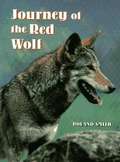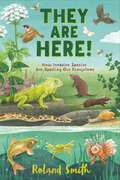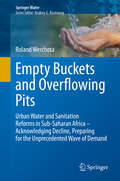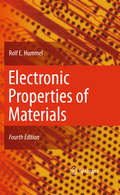- Table View
- List View
Advanced Connection Systems for Architectural Glazing (SpringerBriefs in Applied Sciences and Technology)
by Roham Afghani KhoraskaniThis book presents the findings of a detailed study to explore the behavior of architectural glazing systems during and after an earthquake and to develop design proposals that will mitigate or even eliminate the damage inflicted on these systems. The seismic behavior of common types of architectural glazing systems are investigated and causes of damage to each system, identified. Furthermore, depending on the geometrical and structural characteristics, the ultimate horizontal load capacity of glass curtain wall systems is defined based on the stability of the glass components. Detailed attention is devoted to the incorporation of advanced connection devices between the structure of the building and the building envelope system in order to minimize the damage to glazed components. An innovative new connection device is introduced that results in a delicate and functional system easily incorporated into different architectural glazing systems, including those demanding maximum transparency.
Designing a Sustainable Financial System: Development Goals and Socio-Ecological Responsibility (Palgrave Studies in Sustainable Business In Association with Future Earth)
by Thomas Walker Stéfanie D. Kibsey Rohan CrichtonThis edited collection brings together leading theoretical and applied research with the intent to design a sustainable global financial future. The contributors argue that our world cannot move toward sustainability, address climate change, reverse environmental degradation, and improve human well-being without aligning the financial system with sustainable development goals like those outlined by the United Nations. Such a system would: a) be environmentally and socially responsible; b) align with planetary boundaries; c) manage natural resources sustainably; d) avoid doing more harm than good; and e) be resilient and adaptable to changing conditions. The overarching theme in this collection of chapters is a response to the worldwide, supranational sustainable finance discussions about how we can transition to a new socio-ecological system where finance, human well-being, and planetary health are recognized as being highly intertwined.
Spirituality and Sustainable Development
by Rohana UlluwishewaLooking beyond the materialistic boundary of the conventional development paradigm, this book identifies our spiritual underdevelopment which is being reflected as self-centeredness and greed, as the root cause of conventional development's failure to alleviate poverty and inequality, achieve sustainability and deliver happiness to humanity.
Line You Have Traced
by Roisin Dunnett&‘A haunting and magnificent new voice.&’ Sam J. Miller, author of Blackfish City &‘We can fix what we have done. We can undo the mistakes our ancestors made. We can set right what has been done wrong... You are the first step.&’ In a silverware shop, a young wife works alongside her husband. Amid growing political turmoil, Bea finds solace in the local marsh, where she is visited recurrently by a mysterious presence, logging each appearance carefully in a scarlet journal.In a time like now, Kay navigates friendship, queerness and the temporary job market, whilst contemplating the significance of her life in a world with such an uncertain future. At her grandmother&’s house she finds an intriguing record of an angel&’s visits.A hundred years into the future, outsiders have banded together to live off-grid away from a corrupt government and a city wracked by oppression and climate change. When Ess is chosen for a virgin mission, a journey into the past to save the present, she is guided only by a well-thumbed red notebook…Set against the shifting landscape of East London marshes and expanding over three centuries, this is the breathtaking, urgent story of three women separated by history but threaded together by unknown forces.&‘An inventive, ambitious novel.&’ Chris Power, author of A Lonely Man&‘A gloriously innovative, endlessly surprising gut punch of a novel.&’ Rebecca Tamás, author of Witch
Die Physische Geographie Afrikas
by Roland BaumhauerDas vorliegende Buch ist eine lang überfällige, aktuelle geographisch-geowissenschaftliche Gesamtdarstellung der wesentlichen Geo- und Umweltfaktoren des afrikanischen Kontinents. Im Mittelpunkt stehen Gestein, Relief, Klima, Wasser, Boden, und Vegetation. Diese steuern die landschaftsprägenden Prozesse an der Erdoberfläche und bestimmen Struktur, Funktion und Dynamik des Naturraumes – der natürlichen Umwelt und der vom Menschen durch Landnutzung, Siedlungen, Verkehrswege u.s.w. gestalteten Umwelt. Ergänzende Exkurse vertiefen eine Reihe von wichtigen aktuellen Umweltfragen im Zusammenhang mit der menschlichen Nutzung (z. B. Bodenerosion, Desertifikation), dem Klimawandel oder erläutern geowissenschaftliche Fachbegriffe. Reiche Farbfotographien und spannende Kartographie veranschaulichen die Informationen und sorgen für ein besseres Verständnis. Dem interessierten Leser soll mit dem Buch einerseits ein schneller Überblick über die Physische Geographie des Kontinents gegeben werden. Andererseits kann das Buch als geordnetes Nachschlagewerk genutzt werden. Es wendet sich nicht nur an Studierende der einschlägigen Studiengänge, sondern auch an einen breiten, an allen Umweltaspekten Afrikas interessierten Leserkreis bis hin zu Mitarbeitern von Entwicklungsorganisationen und Fachkräften im Entwicklungsdienst, die grundlegende Informationen zur Physischen Geographie des Kontinents brauchen.
Green Growth, Green Profit
by Roland BergerGreen business is here. It is a multi billion business with enormous growth potential, driven by megatrends such as demographic change, climate change and urbanization. It is driving the transformation of existing businesses and changing the way customers and suppliers act, forcing them to rethink their business strategy.
Global Resources
by Roland Dannreuther Wojciech OstrowskiThis EU-funded project examines the dynamics of conflict, collaboration and competition in relation to access to oil, gas and minerals. It involves 12 different institutions from across the EU and examines oil, gas and other minerals - spanning geology, technology studies, sociology, economics and political science.
The Science of Spin: How Rotational Forces Affect Everything from Your Body to Jet Engines to the Weather
by Roland EnnosA clear and captivating work of popular science that explains rotational force—a basic driver of the universe affecting everything from the cosmos to our own bodies—from the masterful author of The Age of Wood.From the time women first used rotating bobbins to twist thread and men whirled slings around their heads to throw stones, people have found spin fascinating and baffling in equal measure. Now, in The Science of Spin, Roland Ennos shows how rotational motion dominates the workings of the world around us. It has shaped the solar system, galaxies, and black holes. It controls our climate and weather—from the pattern of trade winds through to the local formation of hurricanes and tornadoes. Harnessing the power of spin helped launch civilization, from the first developments of the wheel to the systems that now power the industrial world—propellers, turbines, centrifugal pumps, and electric motors. Even our own bodies are complex systems of rotating joints and levers. But scientists have a tendency to ignore the simple and straightforward. So, 17th-century scientists developed the science of mechanics to explain the phenomenon of the orbit of the planets rather than how machines work. And Newton&’s laws have actually limited our understanding of spin because they focus on linear motion rather than on an intuitive grasp of rotation. As a result, few people realize how spin makes our planet habitable, or how it has been tamed by engineers to make our lives more comfortable. In a lively and engaging style, Ennos presents a new approach to mechanics that not only helps us better understand the world, but also reveals unlikely links between tightrope walkers and tyrannosaurs, catapults and tennis players, stunt cars and long jumpers. By opening our minds, he shows how we can all learn to move about more gracefully, play sports more successfully and safely—and ensure that, like cats, we always land on our feet. A highly entertaining and informative read, whether it be natural or engineered, spin is what really makes the world go round.
The Business of Less: The Role of Companies and Households on a Planet in Peril
by Roland GeyerThe Business of Less rewrites the book on business and the environment. For the last thirty years, corporate sustainability was synonymous with the pursuit of ‘eco-efficiency’ and ‘win-win’ opportunities. The notion of ‘eco-efficiency’ gives us the illusion that we can achieve environmental sustainability without having to question the pursuit of never-ending economic growth. The ‘win-win’ paradigm is meant to assure us that companies can be protectors of the environment whilst also being profit maximizers. It is abundantly clear that the state of the natural environment has further degraded instead of improved. This book introduces a new paradigm designed to finally reconcile business and the environment. It is called ‘net green’, which means that in these times of ecological overshoot businesses need to reduce total environmental impact and not just improve the eco-efficiency of their products. The book also introduces and explains the four pollution prevention principles ‘again’, ‘different’, ‘less’, and ‘labor, not materials’. Together, ‘net green’ and the four pollution prevention principles provide a road map, for businesses and for every household, to a world in which human prosperity and a healthy environment are no longer at odds. The Business of Less is full of anecdotes and examples. This brings its material to life and makes the book not only very accessible, but also hugely applicable for everyone who is worried about the fate of our planet and is looking for answers.
Field Palaeontology
by Roland Goldring"This is the major text on the integration of field palaeontology and sedimentology, particularly valuable for both practical lab exercises and students working independently and unsupervised on field projects"Reviewer's commentField Palaeontology provides a comprehensive, rigorous and unique approach to the analysis of fossils and sediments and offers a practical field guide which no palaeontology student can afford to be without.The past decade has seen immense changes in palaeontology and in the study of sedimentary rocks in general. This edition has been thoroughly revised to take into account these advancements in the subject to produce a book that is unique in its coverage of palaeontology and sedimentology. It aims to provide a basis for evaluating the information potential of fossiliferous sediments, and then to give an outline of the strategy and tactics whicn can be adopted in the field.Field Palaeontology is written for advanced undergraduate courses in palaeontology, palaeoecology, palaeobiology, sedimentology and biostratigraphy within geoscience and geology degrees. It is also useful reading for Masters earth science students and first year postgraduates looking for a grounding in the basics of the subject.
Implications and Consequences of Anthropogenic Pollution in Polar Environments
by Roland KallenbornThe first evidence on the adverse effects of organic pollutants on Arctic ecosystems was provided by international research initiatives more than 30 years ago. Today, the indigenous people of the North are considered to be affected by exposure to persistent organic pollutants (POPs) and metals through their traditional marine food sources. The occurrence of pollutants of emerging concern in remote Polar environments is considered an essential criterion for prioritising this (largely neglected) type of contamination in national, international and global regulation schemes. Initiated during the first international Polar Years (IPY 2007-2009) and continued afterwards, 11 representative initiatives and projects are summarised as chapters in this book, which highlights today's interdisciplinary research on POPs in the Polar environment. The individual chapters describe in detail the consequences, priorities and perspectives of international research on POPs (legacy and emerging xenobiotics), its implications for regulations and scientific priorities including societal and cultural developments in the Arctic, as well as conservation priorities in Antarctica. This book is intended for all readers interested in learning more about modern research on environmental pollutants in the Polar environments (with a strong focus on Arctic environments). The impacts of pollution and climate change on Polar regions and the world as a whole will continue to be felt for many years to come. Sound science is, thus, vital in order to underpin actions that need to be taken at the global, regional and local levels. This book contributes to this highly relevant, interdisciplinary environmental scientific endeavour.
Candid Creatures: How Camera Traps Reveal the Mysteries of Nature
by Roland KaysA riveting collection of photographs capturing wild animals in their native habitats and demonstrating the importance of camera traps.In Candid Creatures, the first major book to reveal the secret lives of animals through motion-sensitive game cameras, biologist Roland Kays has assembled over 600remarkable photographs. Drawing from archives of millions of color and night-vision photographs collected by hundreds of researchers, Kays has selected images that show the unique perspectives of wildlife from throughout the world. Using these photos, he tells the stories of scientific discoveries that camera traps have enabled, such as living proof of species thought to have been extinct and details of predator-prey interactions.Each image captures a moment frozen in the camera’s flash as animals move through their wild habitats. Kays also discusses how scientists use camera traps to address conservation issues, creating solutions that allow humans and wild animals to coexist. More than just a collection of amazing animal pictures, the book’s text, maps, and illustrations work together to describe the latest findings in the fast-moving field of wildlife research.Candid Creatures is a testament to how the explosion of game cameras around the world has revolutionized the study of animal ecology. The powerful combination of pictures and stories of discovery will fascinate anyone interested in science, nature, wildlife biology, or photography.“Full of fabulous pictures of weird and wonderful creatures . . . [Candid Creatures is] loaded with information and carries a strong conservation message.” —Conservation Biology
A Climate Policy Revolution: What the Science of Complexity Reveals about Saving Our Planet
by Roland KupersHumanity’s best hope for confronting the looming climate crisis rests with the new science of complexity. The sheer complexity of climate change stops most solutions in their tracks. How do we give up fossil fuels when energy is connected to everything, from great-power contests to the value of your pension? Global economic growth depends on consumption, but that also produces the garbage now choking the oceans. To give up cars, coal, or meat would upend industries and entire ways of life. Faced with seemingly impossible tradeoffs, politicians dither and economists offer solutions at the margins, all while we flirt with the sixth extinction. That’s why humanity’s last best hope is the young science of complex systems. Quitting coal, making autonomous cars ubiquitous, ending the middle-class addiction to consumption: all necessary to head off climate catastrophe, all deemed fantasies by pundits and policymakers, and all plausible in a complex systems view. Roland Kupers shows how we have already broken the interwoven path dependencies that make fundamental change so daunting. Consider the mid-2000s, when, against all predictions, the United States rapidly switched from a reliance on coal primarily to natural gas. The change required targeted regulations, a few lone investors, independent researchers, and generous technology subsidies. But in a stunningly short period of time, shale oil nudged out coal, and carbon dioxide emissions dropped by 10 percent. Kupers shows how to replicate such patterns in order to improve transit, reduce plastics consumption, and temper the environmental impact of middle-class diets. Whether dissecting China’s Ecological Civilization or the United States’ Green New Deal, Kupers describes what’s folly, what’s possible, and which solutions just might work.
Kentucky Agate: State Rock and Mineral Treasure of the Commonwealth
by Roland L. McIntosh Warren H. AndersonThis informative and fully illustrated volume explores the untold story of agate gemstones hidden in Kentucky’s scenic Knobs Region.With their fine grain and rich assortment of colors, agate stones are coveted by collectors and becoming rarer across the globe. Some of the most beautiful specimens in the world have been found in the rugged terrain of eastern Kentucky. In Kentucky Agate, authors Roland L. McIntosh and Warren H. Anderson reveal the beauty and diversity of this sought-after stone with hundreds of color photographs.Kentucky Agate also reveals locations where agate may be found, offering maps of the region surrounding the city of Irvine, Kentucky, including parts of Estill, Powell, Jackson, Menifee, Madison, and Lee counties. With detailed photographs revealing aspects of the rock not visible to the naked eye, this book also provides fascinating information on the history, geology, chemistry, and formation of the mineral.
Sustainable Action and Motivation: Pathways for Individuals, Institutions and Humanity (Routledge Environmental Ethics)
by Roland MeesSustainable Action and Motivation proposes individual competencies and institutional policies that can help overcome the motivational hurdles that hamper sustainable action. Following the Paris Agreement of 2015 and the UN Sustainable Development Goals, the political momentum urgently to begin the drastic reduction of greenhouse gas emissions has increased significantly. Affluent, high-income OECD countries are expected to take the lead in the global transition to a low carbon society. Given this, we need a better understanding of the motivational problems that people in affluent countries face with acting sustainably. This book investigates the above questions by analysing three fundamentally different perspectives: individuals and their motivation to act sustainably; institutions who take responsibility for issuing policies that steer us towards taking sustainable action; and humanity, each individual member of which ought to understand his or her non-sustainable behaviour in relation to the continued existence of the collective of human beings. Using theories from empirical psychology and a phenomenological approach to the research, this book will be of great interest to students and scholars of practical philosophy, psychology of motivation and environmental psychology, as well as policymakers looking for ways to implement effective policies that encourage pro-environmental behaviour.
Fiducial Reference Measurements for Altimetry: Proceedings of the International Review Workshop on Satellite Altimetry Cal/Val Activities and Applications (International Association of Geodesy Symposia #150)
by Stelios P. Mertikas Roland PailThese proceedings include selected papers from the International Review Workshop on Satellite Altimetry Cal/Val Activities and Applications, held in Chania, Crete, Greece, on 23-26 April 2018. Organised in the context of the European Space Agency Project “Fiducial Reference Measurements for Altimetry” the workshop was cosponsored by the International Association of Geodesy (in particular by the IAG Commission 2, Gravity Field), the European Space Agency, the European Union (the Copernicus Programme), the European Organisation for the Exploitation of Meteorological Satellites (EUMETSAT), Space Geomatica P.C., and the Municipality of Chania.The workshop presented the latest research in the field of satellite altimetry calibration and altimetry applications for monitoring ocean changes and improving Earth observation in an objective, continuous, homogeneous and reliable manner, free of errors and biases. Further, it supported long-term monitoring of climate change by providing a better understanding of environmental changes in the world's oceans, terrestrial surface waters, and Arctic and Antarctic Regions. The outcome was the creation of a scientific roadmap with procedures, protocols, guidelines, and best practices to help international groups working on satellite altimetry to establish SI (Système International d'Unités) traceability of their measurements, results and data products.
The World Won't Wait
by Roland Paris Taylor OwenThe need for an ambitious and forward-looking Canadian international strategy has never been greater. The worldwide changes that jeopardize Canadian security and prosperity are profound, ranging from the globalization of commerce, crime, and political extremism to the impact of climate change on the economy and environment. The reaction from Canada's policymakers, at least so far, has been underwhelming.In The World Won't Wait, some of Canada's brightest thinkers respond. Covering both classic foreign policy issues such as international security, human rights, and global institutions and emerging issues like internet governance, climate change, and sustainable development, their essays offer fresh and provocative responses to today's challenges and opportunities. The proposals are striking and the contributors diverse: Toronto's chief city planner makes the case that Canada needs a global urban agenda, while a prominent mining executive explains how to revitalize the country's position as a world leader in the sector. Their essays are sure to spark the kind of debate that Canada requires if its international policy is to evolve into the twenty-first century.
Point Sources and Multipoles in Inverse Scattering Theory (Chapman & Hall/CRC Research Notes in Mathematics Series)
by Roland PotthastOver the last twenty years, the growing availability of computing power has had an enormous impact on the classical fields of direct and inverse scattering. The study of inverse scattering, in particular, has developed rapidly with the ability to perform computational simulations of scattering processes and led to remarkable advances in a range of
Bentonite Clay: Environmental Properties and Applications
by Roland PuschStudies the Environmental, Cosmetic, and Pharmaceutical Applications of Bentonite ClayBentonite clay, of which members of the smectite family of clay minerals are particularly important, has proven to be effective in sealing off wastes from groundwater. Bentonite Clay: Environmental Properties and Applications explores the mineralogy of clays in ge
Geological Storage of Highly Radioactive Waste
by Roland PuschThe book describes and assesses current concepts for long-term disposal of highly radioactive waste. Different types of rock are discussed and assessed with respect to practical difficulties in the construction of a repository, and the efficiency of isolating radioactive waste. Safety matters are most important and are treated in the respective chapters and in a final, conclusive chapter. Cost issues and related quality matters are discussed for the case of constructing a virgin repository and repositories in the form of converted abandoned mines.
Journey of the Red Wolf, First Edition
by Roland SmithThe story of the red wolf's journey from the brink of extinction to its reintroduction to the wild follows the endeavors of the Red Wolf Recovery Program, from the 1971 capture of seventeen endangered wolves to their joyful release.
They Are Here!: How Invasive Species Are Spoiling Our Ecosystems
by Roland SmithFrom the New York Times-bestselling author, Roland Smith, comes a fascinating, fact-filled resource that explores how humans have introduced—on purpose and by accident—plants and animals to parts of the world where they were previously unknown. . .sometimes with disastrous results. Did you know that brown rats were brought to the United States in the eighteenth century on a ship from England? Or that thousands of exotic pets were released into the Florida Everglades after a hurricane in 1992, leading to today’s booming Burmese python population? All over the country, non-native species from around the world have been introduced to our lands, irrevocably changing the natural balances of their new habitats. This is the story of some of those newcomers, but also of human error and nature gone wild. By looking at thirty different intrusive plants and animals, They Are Here! explores invasive species, their impact on our environment, and the steps we can take to support local ecosystems under threat.
Environmental Literacy in Science and Society
by Roland W. ScholzIn an era where humans affect virtually all of the earth's processes, questions arise about whether we have sufficient knowledge of human-environment interactions. How can we sustain the Earth's ecosystems to prevent collapses and what roles should practitioners and scientists play in this process? These are the issues central to the concept of environmental literacy. This unique book provides a comprehensive review and analysis of environmental literacy within the context of environmental science and sustainable development. Approaching the topic from multiple perspectives, it explores the development of human understanding of the environment and human-environment interactions in the fields of biology, psychology, sociology, economics and industrial ecology. The discussion emphasises the importance of knowledge integration and transdisciplinary processes as key strategies for understanding complex human-environment systems (HES). In addition, the author defines the HES framework as a template for investigating sustainably coupled human-environment systems in the 21st century.
Empty Buckets and Overflowing Pits: Urban Water and Sanitation Reforms in Sub-Saharan Africa – Acknowledging Decline, Preparing for the Unprecedented Wave of Demand (Springer Water)
by Roland WerchotaThis book provides a multi-level and multi-dimensional insight into urban water and sanitation development by analyzing sector reforms in Africa. With the recent events in mind - water shortages in Cape Town, widespread cholera in Haiti, mass-migration from low-income countries, etc. – it elaborates a pressing topic which is directly linked to the precarious living conditions of the urban poor in the developing countries. It is urgent to acknowledge the proposed findings and recommendations of the book which will help to improve the situation of potential refugees in their home countries with a realistic vision for the development of the most basic of all life supporting services.So many efforts to reverse the negative trend in water and sanitation development have failed or targets have been repeatedly missed by far without notable consequences for decision makers on different levels and institutions. It has unnecessarily consumed many young lives, contributed to keep billions in poverty until today and fostered discrimination of women. The knowledge gap and the confusion in the sector lined out in the book becomes evident when a national leader in a low-income country declares a state of emergency in urban water and sanitation while at the same time global monitoring publishes an access figure for urban water of over 90% for the same country. It is time to change this with an effective sector development concept for our partner countries and a more realistic discourse on global level.The book argues for a sweeping rethinking and combines extended local knowledge, lessons learned from history in advanced countries and thorough research on reforms in Francophone and Anglophone developing countries. This was possible because the writer was working in Sub-Saharan partner countries for almost 30 years as an integrated long term advisor in different sector institutions (ministry, regulator, financing basket and different sizes of utilities) and had the opportunity to cooperate closely with the main development partners.The reader has the opportunity to obtain a comprehensive understanding of how the sector works and sector institutions in low-income countries function and can discover the reasons behind success and failures of reforms. The book also covers issues which have a significant influence on urban water and sanitation development but are hardly the subject of discussions. It helps to make the shortcomings of the water and sanitation discourse more apparent and assist institutions to move beyond their present perceptions and agendas. All of this makes the book different from other literature about urban water and sanitation in the developing world.
Electronic Properties of Materials: An Introduction Engineers
by Rolf E. HummelThis text on the electrical, optical, magnetic, and thermal properties of materials stresses concepts rather than mathematical formalism. Suitable for advanced undergraduates, it is intended for materials and electrical engineers who want to gain a fundamental understanding of alloys, semiconductor devices, lasers, magnetic materials, and so forth. The book is organized to be used in a one-semester course; to that end each section of applications, after the introduction to the fundamentals of electron theory, can be read independently of the others. Many examples from engineering practice serve to provide an understanding of common devices and methods. Among the modern applications covered are: high-temperature superconductors, optoelectronic materials, semiconductor device fabrication, xerography, magneto-optic memories, and amorphous ferromagnetics. The fourth edition has been revised and updated with an emphasis on the applications sections, which now cover devices of the next generation of electronics.
